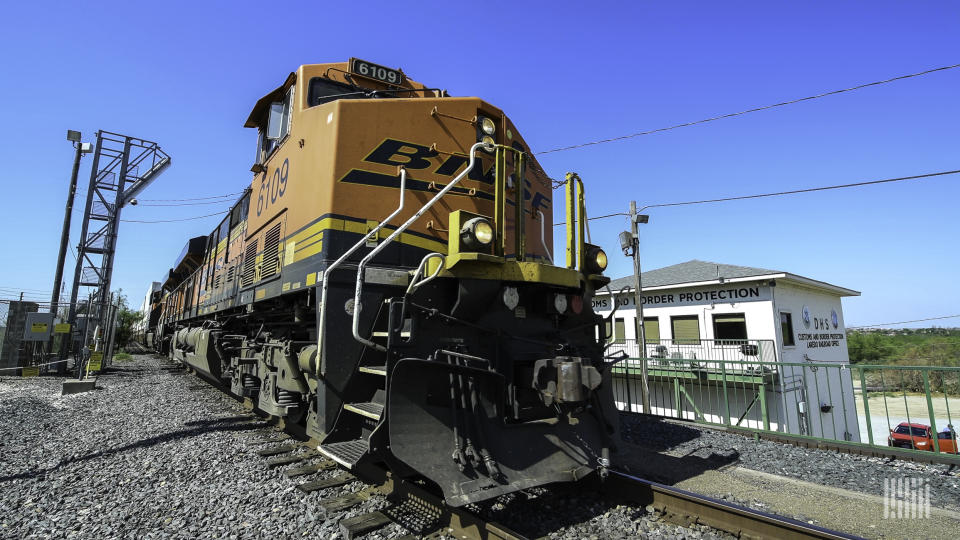CBP halts freight rail operations at 2 Texas ports of entry

U.S. Customs and Border Protection on Monday suspended freight rail operations at three border bridges connecting Texas and Mexico in response to increased levels of migrant smuggling operations in the region.
The suspension of cross-border freight rail operations in El Paso and Eagle Pass, Texas, was made after reports of smuggling operations attempting to use trains in Mexico to transport migrants into the U.S., CBP officials said.
“CBP is continuing to surge all available resources to safely process migrants in response to increased levels of migrant encounters at the Southwest Border, fueled by smugglers peddling disinformation to prey on vulnerable individuals,” CBP said in a statement. “After observing a recent resurgence of smuggling organizations moving migrants through Mexico via freight trains, CBP is taking additional actions to surge personnel and address this concerning development, including in partnership with Mexican authorities.”
The El Paso and Eagle Pass rail bridge suspensions took effect at 9 a.m. EST Monday. CBP officials said the suspensions will be temporary but did not provide a time frame for the reopening of the rail bridges.
El Paso has two railroad bridges, one each for BNSF Railway and Union Pacific (NYSE: UNP). Eagle Pass has one rail bridge that serves both Union Pacific and BNSF.
In response to the suspensions, Union Pacific has placed an embargo on its U.S.-Mexico freight operations in Eagle Pass and El Paso. Union Pacific said the embargo will affect 60 trains and nearly 4,500 rail cars.
“These locations represent 45% of cross-border Union Pacific business and include goods critical to the U.S. economy,” the company said on its website. “There isn’t enough capacity at our other four gateways to reroute them. With Christmas and the New Year’s holidays just days away, Union Pacific is in close communication with multiple government agencies and our customers, urging that the crossings closed by CBP be reopened.”
Union Pacific said the suspension affects the transport of everything from agricultural products, food and beverages, automotive products (finished vehicles and parts), consumer goods and industrial commodities (metals and cement).
CBP previously closed the Eagle Pass gateway in September because of a surge in migrants attempting to cross the border in South Texas.
BNSF officials said they were disappointed with the decision to close the El Paso and Eagle Pass rail bridges.
“BNSF is committed to border security as well as protecting the U.S. economy. BNSF Railway was disappointed to learn that the Eagle Pass and El Paso border crossings have been closed, given how important the movement of goods by rail is for businesses, consumers and the economy, particularly with Christmas just days away,” BNSF spokeswoman Lena Kent said in an email to FreightWaves. “We are in regular communication with CBP and other federal agencies urging both crossings be re-opened immediately. We are also working closely with our customers to meet their needs and to prevent further congestion stemming from the crossing closures. Every day of closure increases the impact to the supply chain for critical commodities, including automobiles, industrial products and grain.”
The Association of American Railroads (AAR) called for an immediate reopening of both rail crossings.
“The urgency of reopening these crossings and restoring rail service between the two nations cannot be overstated,” AAR President and CEO Ian Jefferies said in a news release. “There are not separate U.S. and Mexican rail networks; there is only one interconnected North American rail network. Every day the border remains closed unleashes a cascade of delay across operations on both sides of the border, impacting customers and ultimately consumers.”
Union Pacific and BNSF operate 24 trains daily at the two crossings, moving agricultural products, automotive parts, finished vehicles, chemicals, consumer goods and more, according to Jefferies.
CBP has adjusted its operations to handle an influx of migrants attempting to use illegal pathways into the U.S.
In Eagle Pass, northbound passenger vehicle traffic remains suspended at Eagle Pass International Bridge 1, which has affected commercial cargo truck movements. In San Diego, San Ysidro’s Pedestrian West operations remain suspended. In Lukeville, Arizona, the Lukeville port of entry remains closed, CBP said.
“Over the past several weeks, CBP has made a number of operational adjustments in order to maximize our ability to respond, process, and enforce consequences,” CBP said.
Along with the disruption from migrants, the Texas Department of Public Safety began safety inspections on Nov. 28 for all cargo trucks arriving from Mexico in Eagle Pass and Del Rio, Texas.
Cargo truck wait times at the Eagle Pass port of entry are currently over two hours.
More articles by Noi Mahoney
Mexico averaged 57 thefts a day from cargo trucks in Q3
The top US-Mexico business stories of 2023
Borderlands: Texas company aims to help keep returns out of landfills
The post CBP halts freight rail operations at 2 Texas ports of entry appeared first on FreightWaves.
